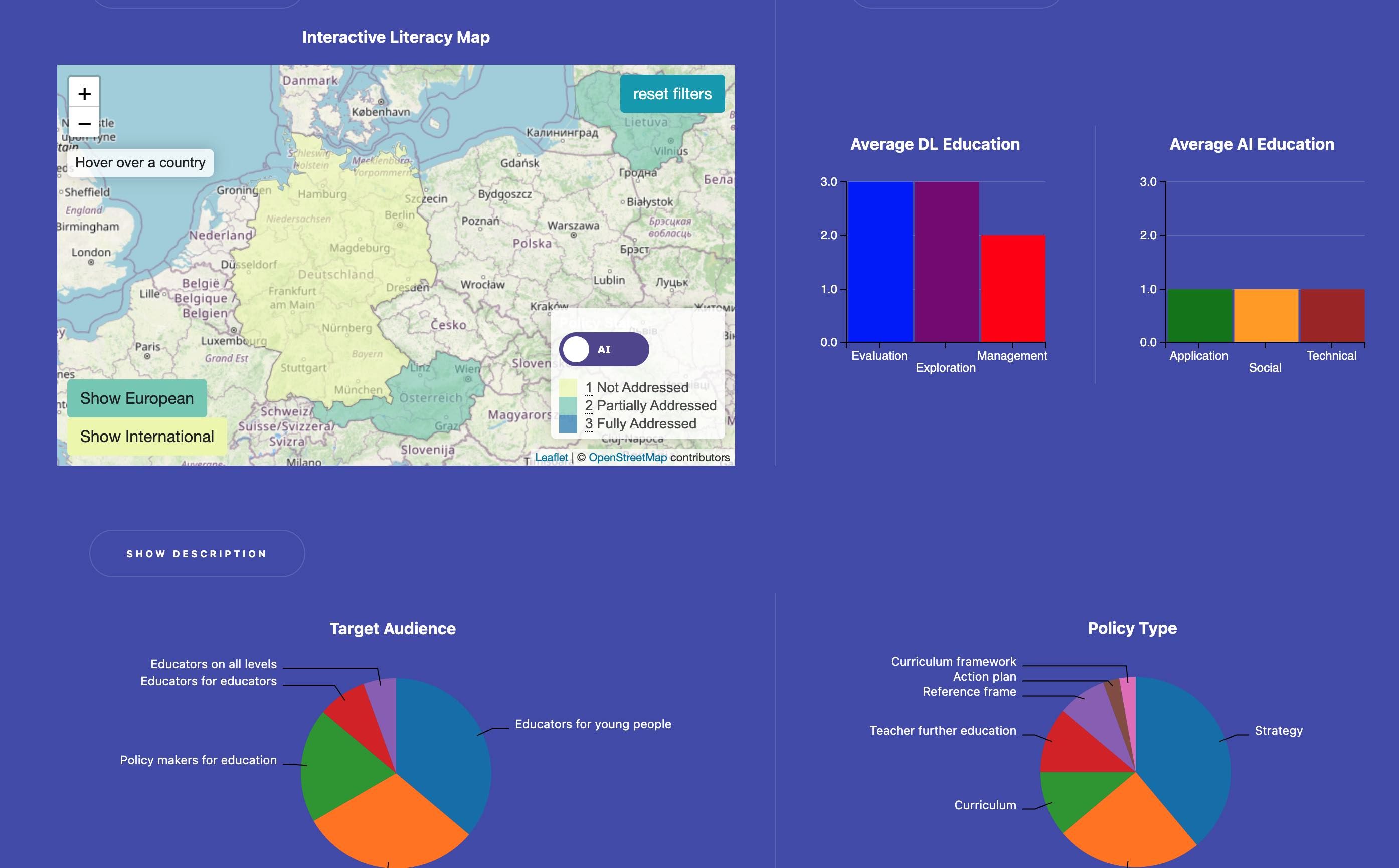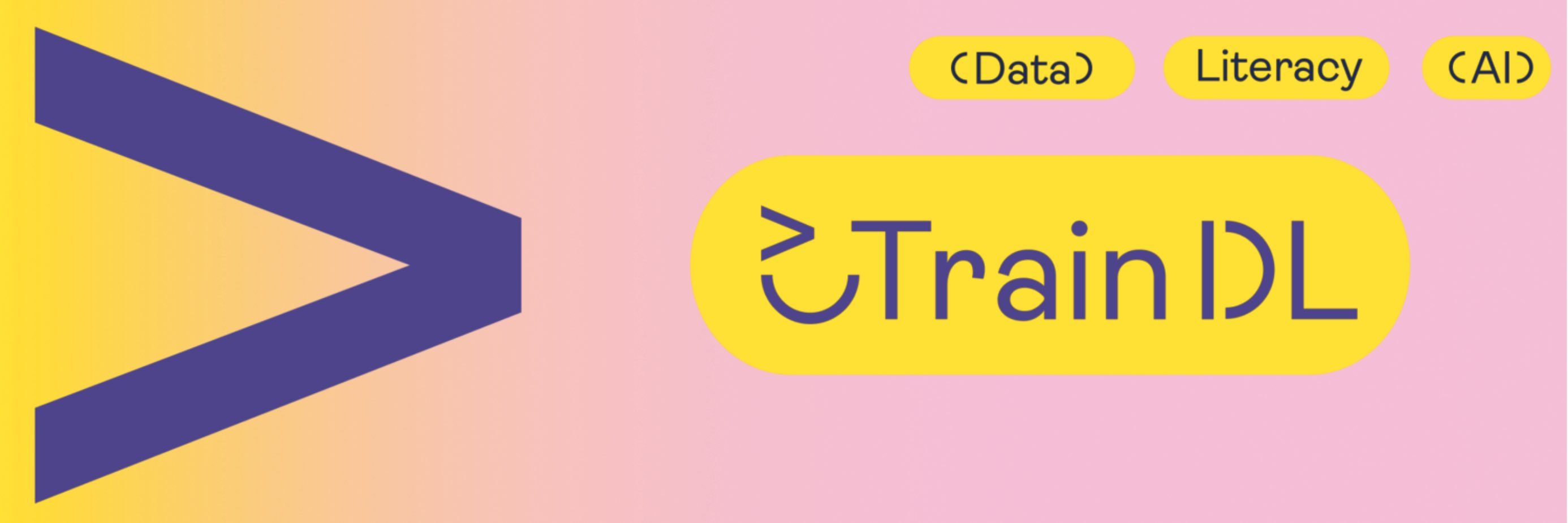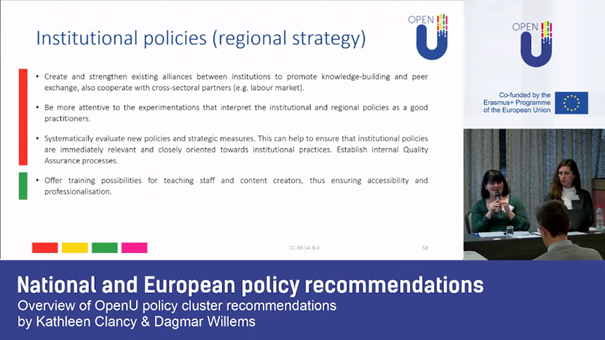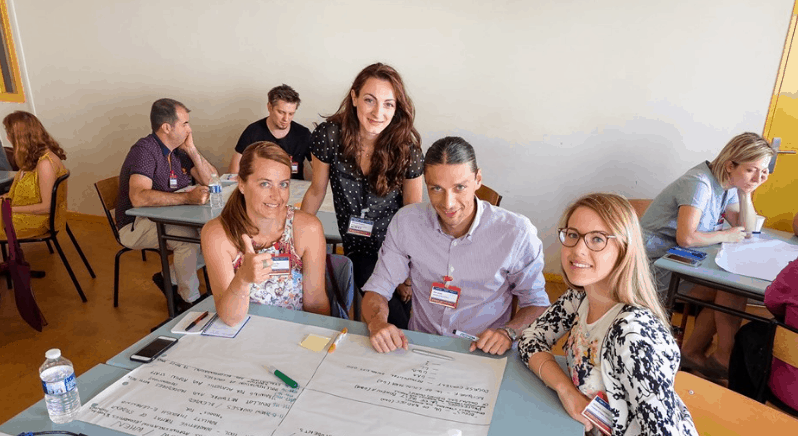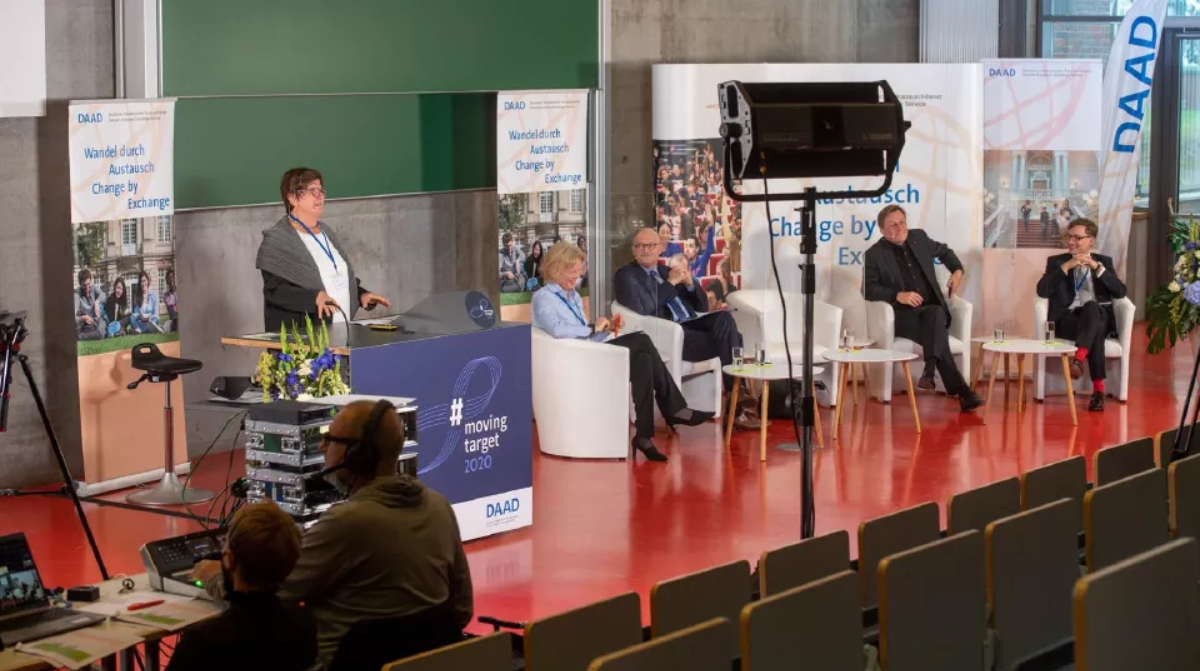News
TrainDL – How well are AI and data literacy education embedded in policy?
Take a look at an overview of policies on data literacy and AI education in three European countries!
TrainDL is a European education policy project funded by the European Union in the Erasmus+ program, with partners in Germany, Lithuania and Austria. The central goal is to provide evidence-based recommendations for the structural implementation of data literacy and AI skills in curricula and education systems across Europe.
To evaluate the state of policies on data literacy and AI education and identify possible gaps in current policy, the TrainDL Policy Monitor was developed: Check out the interactive map and compare systems for policies in all three countries at https://traindl-policymonitor.ocg.at/!
It is still work-in-progress – currently, we are focusing on improving and extending this monitor with policies from other countries: If you can provide input such as information regarding further policies or suggestions for improvement, please contact us at https://train-dl.eu/en/contact!
Setting priorities within digital education policy: Recommendations from institutional practice
The OpenU Closing Event hinged on the presentation of recommendations on institutional, national and European policies for learning, mobility, and cooperation and took place on November 14th in the center of Brussels, Belgium. The event was open to members of the public and could be followed via live stream. The presentation reflected findings of the “Policy Cluster” which was coordinated by the German Academic Exchange Service – DAAD alongside active representatives of Ministries of Education from Belgium (Flemish Community), France, Germany, Latvia, Portugal, and Spain as well as the Erasmus Student Network.
Before the discussion of concrete policy recommendations commenced in the lecture hall and on Mentimeter, ministry representatives were able to succinctly summarise the policy actions in their countries while the Erasmus Student Network offered their view on necessary developments. In conclusion, many policy priorities, such as Open Educational Resources and Micro-Credentials, are mirrored throughout the participating countries.
You can view the live stream here: https://www.youtube.com/watch?v=IlObp0SNxq0&feature=emb_imp_woyt
Online Workshop: How to design for the digital classroom - from practices to pedagogical guidelines
The OpenU webinar "How to design for the digital classroom - from practices to pedagogical guidelines" held by DAAD in collaboration with EADTU on Thursday the 14th of November was a success. The experts talked about the offering of online courses and about the potential digital learning formats hold with around 50 participants.
The aim of the workshop was to offer a compact course to support pedagogical perspectives in online learning. Experts touched upon the models and guidelines for key educational digital formats, which resulted from the OpenU project (Online Pedagogical Resources for European Universities) and the corresponding BLOOM hub.
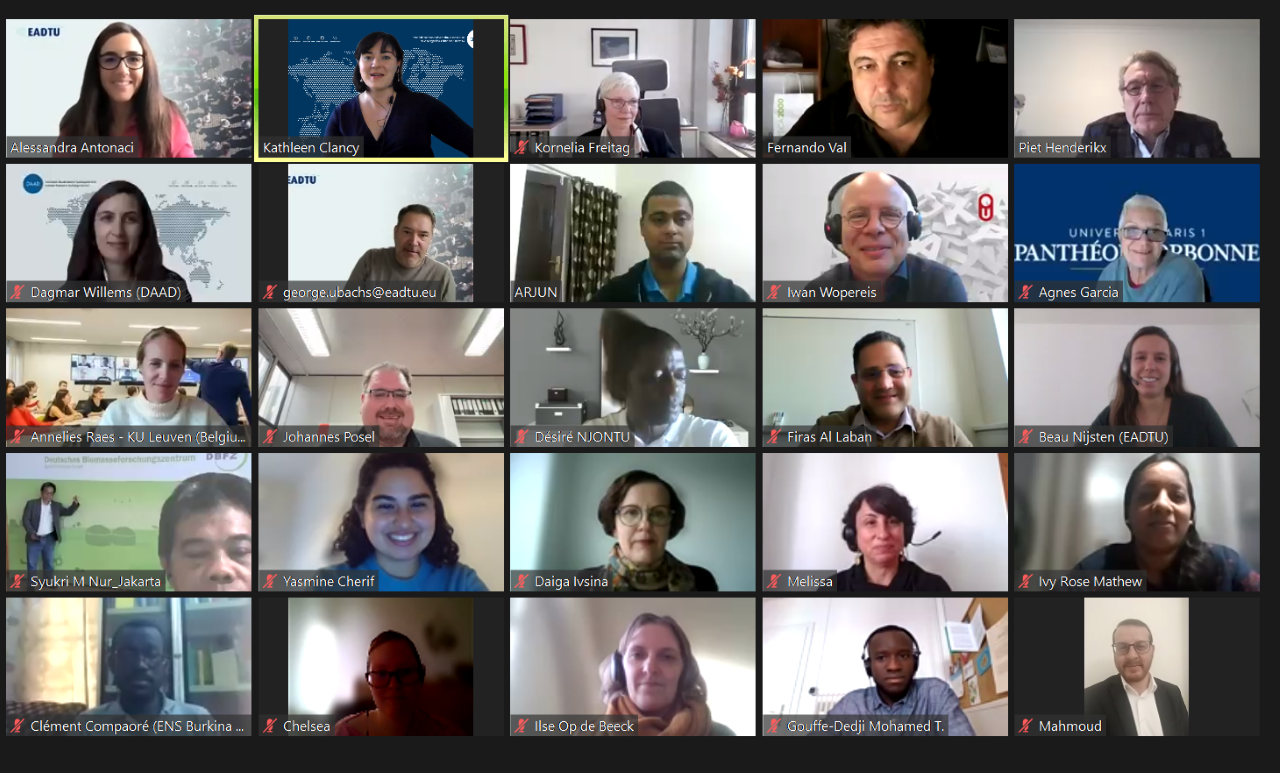
OpenU Experimenting with Online Pedagogical Resources in European Universities
The OpenU international scientific conference "Experimenting with Online Pedagogical Resources for European Universities" was successfully held in Paris on the 13th and 14th of October. During two days, about a hundred academics, researchers and stakeholders from different disciplines presented their practices, academic experiences and strategic priorities. These contributions addressed a wide range of topics such as creativity in education, digital technology in universities, student engagement, sustainable development, entrepreneurship, as well as international and inter-university collaboration.
The international conference concluded the experimentation process organised throughout the OpenU project. The research and proposals presented at the conference will be published in the online journal Education Sciences. The priorities and results discussed during the sessions will additionally be integrated into the project's policy recommendations, which will be disseminated at the OpenU closing event in Brussels on 14th November.
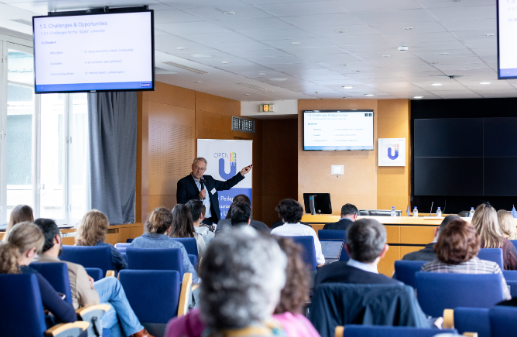
© Pascal Levy/Université Paris 1 Panthéon-Sorbonne
OpenU International Conference "Experimenting with Online Pedagogical Resources for European Universities"
The OpenU project is pleased to announce open registration to its international conference, featuring discussions, peer-learning sessions and speakers sharing their experiences and recommendations about how we can move forward to innovative practices in higher education.
Join us in Paris on the 13th and 14th of October as we collaborate, share and connect insights, case studies, toolkits, ideas and stories of change woven together to inspire more change.
The event is open to all stakeholders of the EHEA as well as participants interested in learning about innovative practices in mobility, learning and cooperation activities. Check our page to learn more about speakers and topics, and register here.

Spot on: The Bloom Hub on the stage
With autumn at the front door, we're happy to provide you with a good reason to stay inside and escape the rainy days. The Bloom Hub for blended and online learning, networking, and mobility evolves, and we're inviting you to take a peek and discover its components. Read through our first pedagogical guidelines and come join us in the Community Portal to weigh in and share ideas and practices in a digital get-together!
Additionally, we are preparing shared spaces for resources to promote learning offers, and co-create and co-deliver innovative pedagogies and learning opportunities. We’re looking forward to offering a comprehensive catalog of courses from universities, as well as support for the administration of joint programmes and diplomas. But first and foremost, we’re excited to welcome you on board!
Have a look at the BLOOM hub here
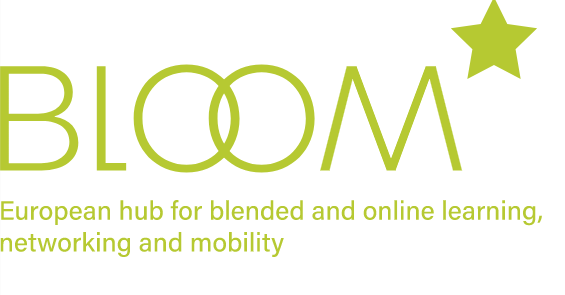
OpenU International Conference "Experimenting with Online Pedagogical Resources for European Universities"
The OpenU project is pleased to announce open registration to its international conference, featuring discussions, peer-learning sessions and speakers sharing their experiences and recommendations about how we can move forward to innovative practices in higher education. Join us in Paris on the 13th and 14th of October as we collaborate, share and connect insights, case studies, toolkits, ideas and stories of change woven together to inspire more change.
The event is open to all stakeholders of the EHEA as well as participants interested in learning about innovative practices in mobility, learning and cooperation activities. Check our page to learn more about speakers and topics, and register here.

OpenU High-level Authorities’ Meeting in Berlin
Hosted by the German Federal Ministry of Education and Research (BMBF) and the German Academic Exchange Service (DAAD) the HLAM spotlighted the theme of “Digital infrastructures for international collaboration in European Higher Education: Institutional practice meets national and EU policy”.
Around 30 in-person and remote participants took the time to discuss German national strategies on digital internationalisation, OER and networked learning platforms and how these aims correspond with the development of the BLOOM hub. Practice examples were also taken into consideration with shared input from the European University Alliances UNITE! And EPICUR.
The resulting policy recommendations on infrastructure requirements, institutional practices & policies as well as national & EU-wide regulations will be presented during the Closing Conference on Nov 14 in Brussels.
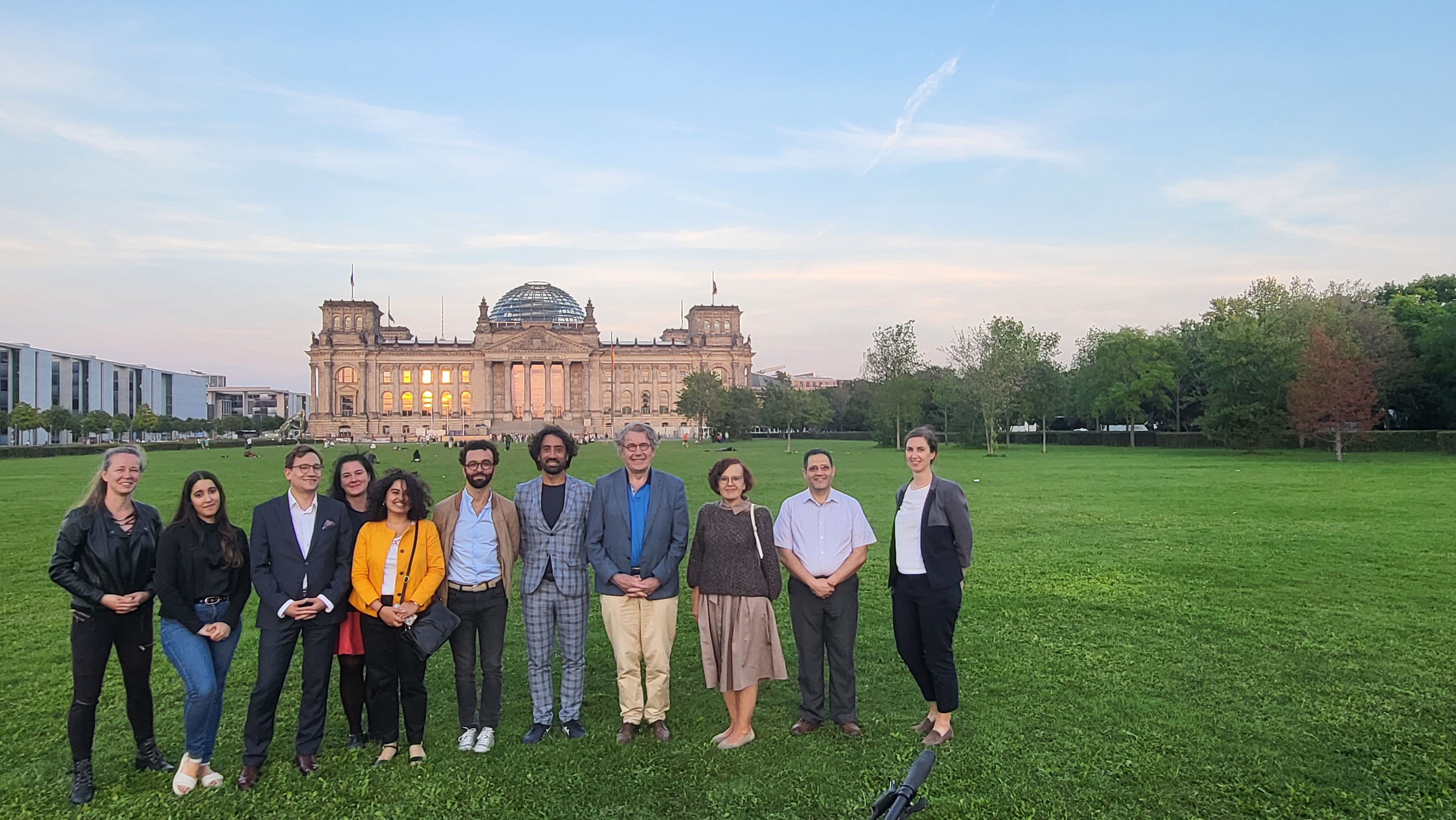
Publication of pedagogical guidelines for innovative learning
Check out the three pedagogical guidelines developed and elaborated by EADTU as part of the OpenU project, now available on the project's website.
Pedagogical guidelines intend to provide practioniers with good practices in the field of digital education, cooperation and mobility. The three documents specifically relate to:
(1) the design and development of joint micro-credential programme in higher education;
(2) the design and development of joint master's programme;
(3) the design and development of joint micro-credential courses and microlearning units in higher education.
Consult out project page to stay tuned for the upcoming delivery of the four next guidelines, and their publication into the BLOOM hub.

OpenU at #EUNIS2022
Firas Al Laban, Katharina Engel, Alexander Knoth and Ulrike Lucke will present on June 2nd the OpenU project at the EUNIS Conference. Specifically, the presentation investigates cross-institutional collaboration of European Higher Education Institutions (HEIs) from a policy perspective, using virtual mobility as a case study. In the framework of policy experimentation, two instruments to provide an evidence basis are examined: policy dialogues between high-level authorities, institutional policymakers and practitioners, and evaluation of local implementations of existing policies. The authors further describe these instruments along with the results obtained, reflect on the methodology used, and finally derive recommendations for the policy process.
If you wish to get in touch with the authors contact Firas Al Laban and Katharina Engel.
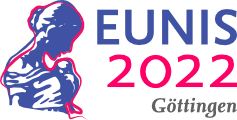
OpenU High-Level Authorities’ Meeting in September
Hosted by the DAAD on behalf of the German Federal Ministry of Education and Research (BMBF), the OpenU project’s next High-level Authorities’ Meeting will take place on 5-6 September.
The meeting will focus on the topic of “Digital infrastructures for international collaboration in European higher education. Institutional practice meets national and EU policy”. The meeting will be hosted in Berlin. It will bring together policy makers, researchers, and experts from practice with their colleagues from France, the Flemish Community, Latvia, Portugal and Spain.
Recommendations gathered during the event will be shared with the project consortium and will be integrated into the public Policy Recommendations that are a final deliverable of the project.
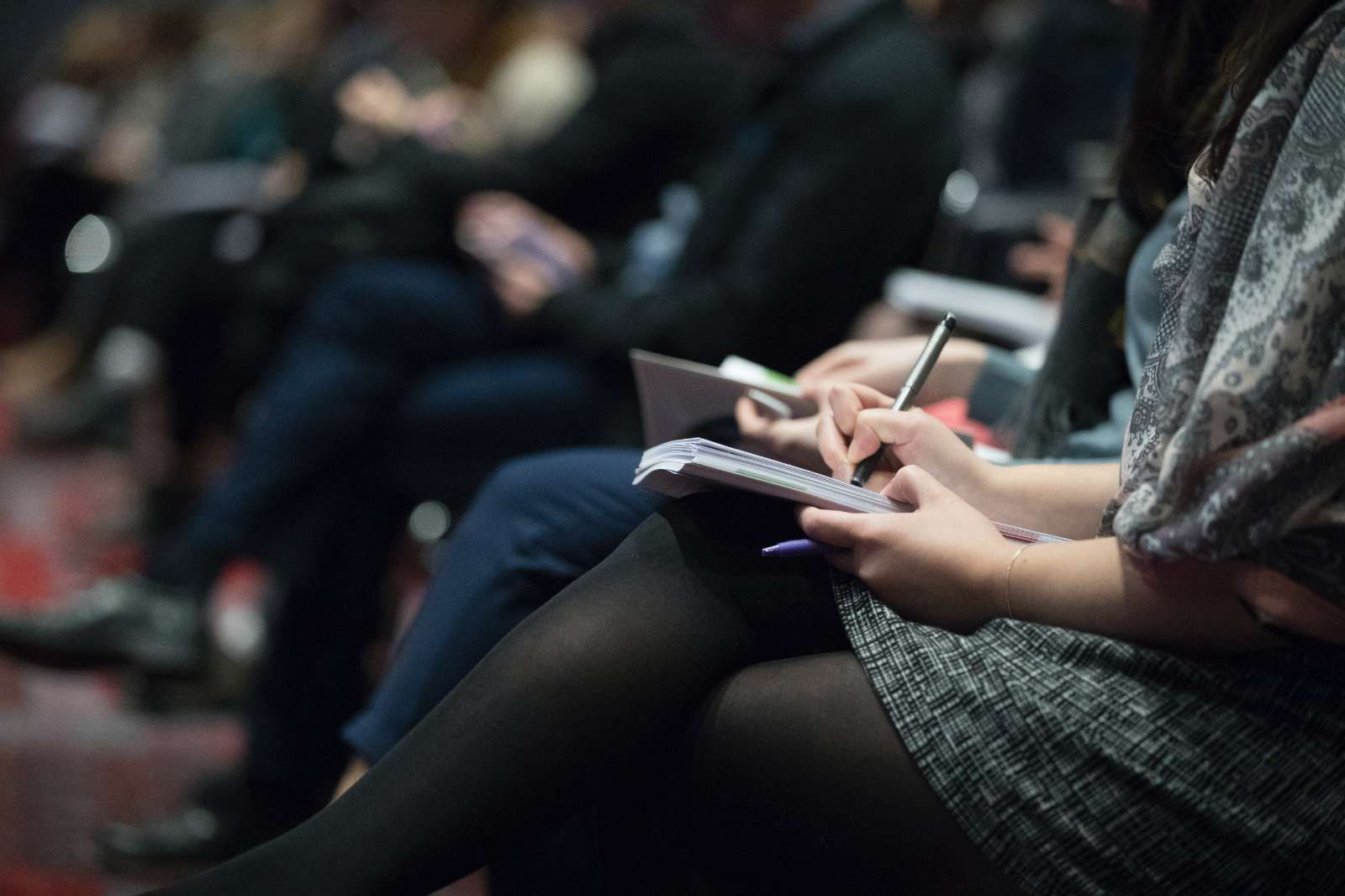
Archive
OpenU project partners meet in Paris
OpenU partners from 10 European countries gathered on the 25th of March to reflect upon innovation in higher education.
The 2022 OpenU consortium meeting held in Université Paris 1 Panthéon-Sorbonne included talks on numerous topics of innovation in higher education. Partners met in sessions both online and at the Paris 1 university's historical campus to examine the different aspects of European collaboration and the significance of policy experimentation.
The aim of this consortium meeting was to provide partners with the opportunity to meet, share, and discuss developments of the project and the latest resutls and plan future actions. During this day-long event, participants gained insights into the policy dialogue process undertaken in the framework of the project and discussed the important reflections emerging from innovative practices of experimenters and evaluators and their strategic implications.
Partners were aslo able to learn more about the BLOOM hub current test-bed version. This digital platform is one of the main final outcomes of OpenU. It will aim to link local university servers, share resources and good practices, promote European learning opportunities and integrate solutions to facilitate student and staff mobility.
4 April 2022
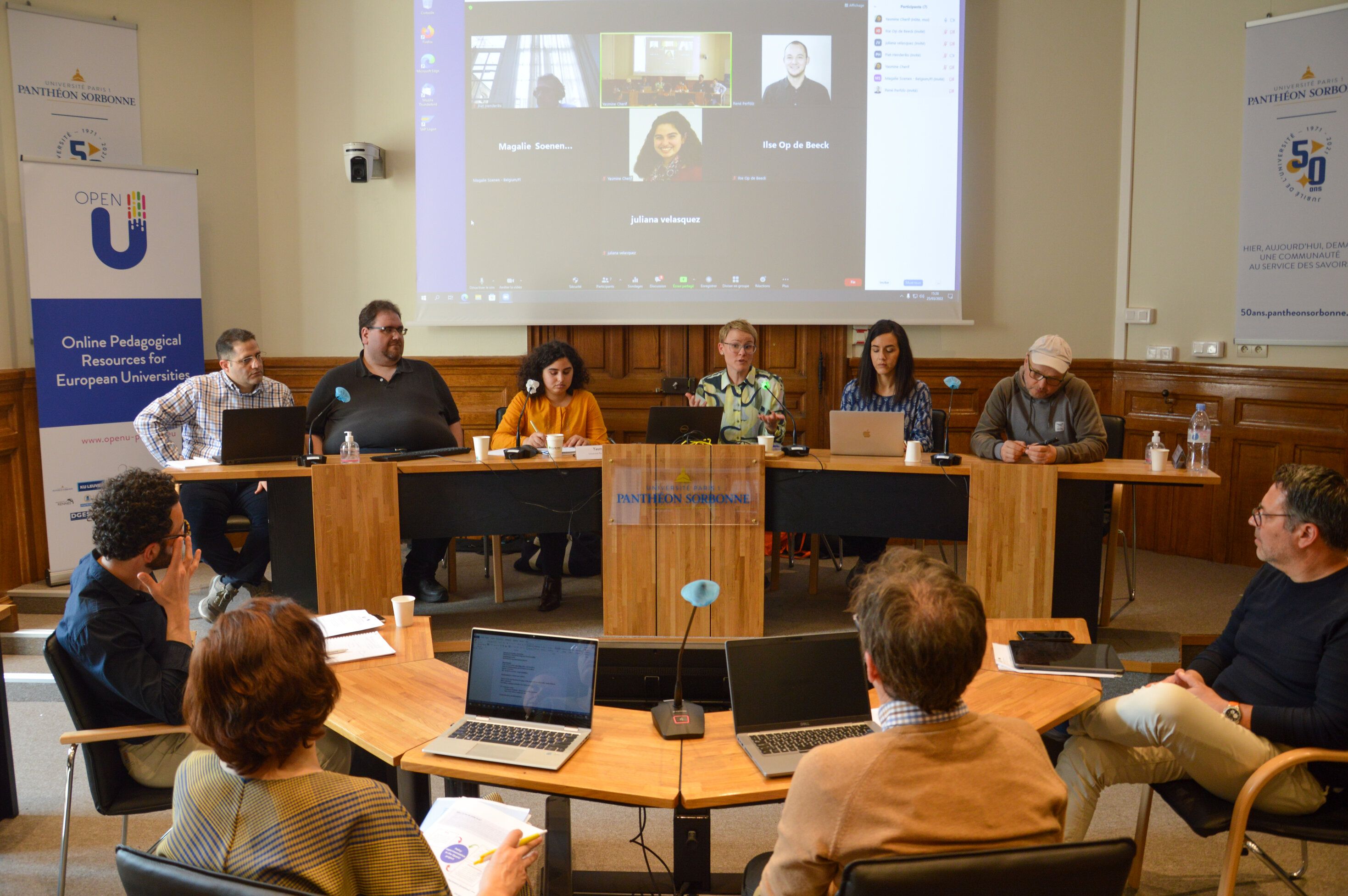
The Experimentation continues with the second phase: the development
The Experimentation continues with the second phase: the development
Linking experiments with the hub platform
Experimentation is an essential task in the OpenU project, it relies on the ability of practices (undertaken by the partners) to bring out the points of friction that testify the need for transformation in the rules of governance at institutional, national, and European levels for European HEIs (Higher Education Institutions).
In its first phase of experimentation were identified the users’ needs (meaning with users: stakeholders at European HEIs) and, consequently the functionalities that the Bloom hub will require to guarantee a satisfactory level of efficiency.
The second phase of experimentation is entering its fourth month and consists of developing the functionalities of the Bloom hub in accordance with the users’ needs, identified in the first phase.
17 March 2022
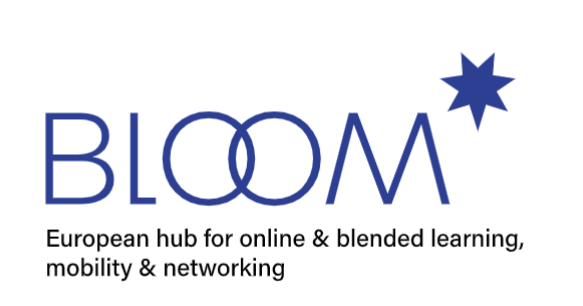
Sharing is caring: the esper(t)imenters share the first round of results involving the high-level authorities
Sharing is caring: the esper(t)imenters share the first round of results involving the high-level authorities
On January 20, 2022, took place a Peer Learning Activity (PLA) was hosted by the Complutense University of Madrid. During the PLA were shared the results of the first experimentation phase conducted by scholars, administrative and technical staff, which run from June to December 2021.
Two main sessions have paced the PLA: a first moment where exper(t)imenters have shared experiences and results with their peers; and a second part opened to representatives of High-Level Authorities involved in the OpenU project.
This first meeting was a crucial moment in the rise of knowledge on needs and practices. It has shown, on one side, how innovation and cooperation can infuse the three different spheres of learning, mobility, and research, increasing participation, and on the other how they can trigger the development of strategies to include digital devices as a source of new engaging and satisfying practices.
11 March 2022
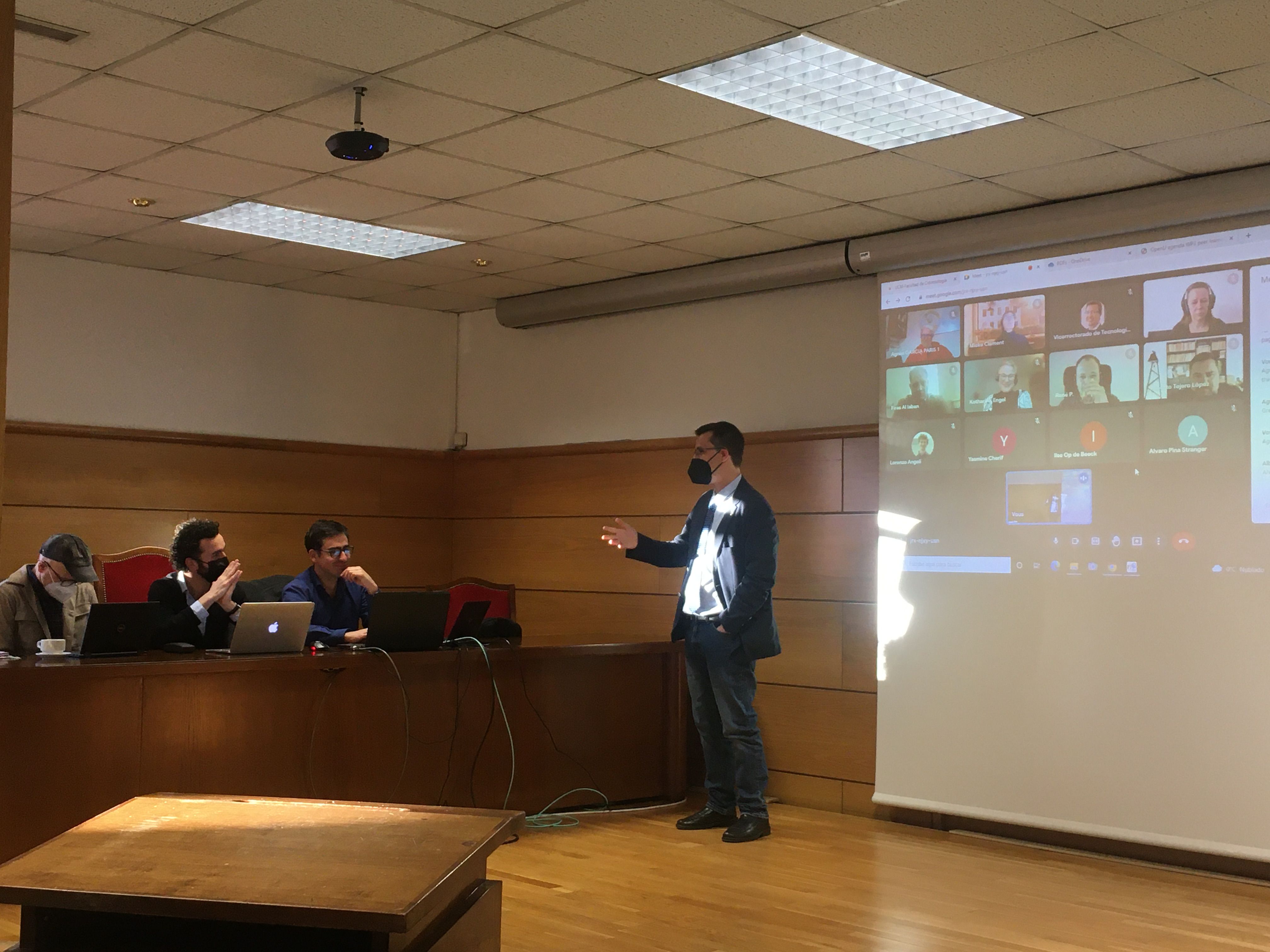
The first round of experimentations was successful!
The experimentation cluster, led by the University of Rennes 1 and Paris 1, together with the consortium partners: Aalto University, Freie Universität Berlin, Paris 1, Universidad Complutense Madrid, Universidad Politecnica de Madrid, University of Trento, University of Bologna, and KU Leuven, have conducted the first round of experimentations (since June 2021) performing a series of pedagogical activities, involving trainers, academics, and students from different European universities and programs and…
They have successfully identified some potential functionalities for the Bloom Hub!!!!
The first round of experimentation has been tested inter-university collaboration in different subjects, such as evaluation in distributed learning courses, management of virtual mobility, and teamwork in virtual settings.
On the basis of the results gathered the experimentation cluster partners were able to identify and propose a detailed list with more than 30 possible hub's functionalities, among these: multiple peer-review options for students and professors, automatic course recommendation system according to students' level and interests, catalogue view of courses, enrolment, and pre-enrolment procedures, and connection with existing platforms (UnaEuropa, Erasmus, etc.).
The second round of experiments will run in January, 2022.
Do you want to find out more about our results? Then Do Not Miss our conference 'Experimenting with Online Pedagogical Resources for European Universities (OpenU)', which will take place in October 2022 in Paris.
Our results will be also published in a Special Issue of Education Sciences.
23 November 2021

Blended Learning Content Webinars: OpenU Project - 1st round Experiments by Aalto
There is an ever-increasing pressure for the personnel in education and research-based organizations to produce high-quality professional content via modern online channels. By responding to this need, the OpenU project offers three (3) topical webinars on Creating Blended Learning Content. The first session Video Production Process comes up on Wed November 24th from 16:00-17:00 (>> Register ).
Aalto University invites you to participate in the following three (3) webinars (each 60 min) giving guidance on the professional Video Production Process. As video production is often the most central element in online course creation, we will look into the video production process and explore what happens at each stage. We will draw your attention to common pitfalls and highlight key elements needed to make a successful video. There is an interactive discussion part where you can set related questions to the professionals in this domain.
1st Webinar: Video Production Process (60 min) - 24.11.2021 at 3pm (CET)
2nd Webinar: How to Write a Great Video Script (60 min) - 1.12.2021 at 3pm (CET)
3rd Webinar: Video Presentation Skills (60 min) - 8.12.2021 at 3pm (CET)
23 November 2021
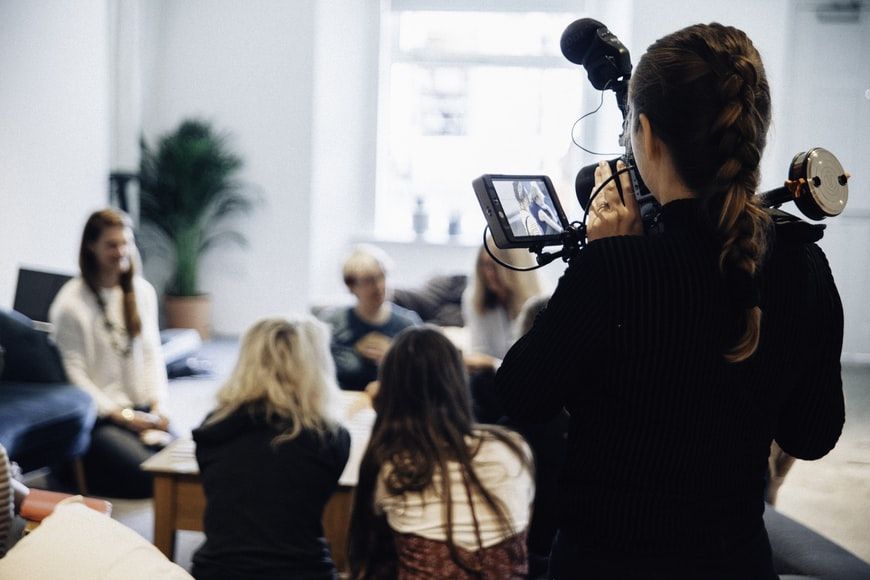
Integrating users’ needs and realities in the fast-moving era of digital transformation – Lessons learned from the OpenU project
On the 4th of November 2021, Yasmine Chérif, OpenU coordinator gave a presentation at the IHE2021 conference in Bari, Italy. Yasmine presented the levers and approaches used within the OpenU project to allow evolving needs and different perspectives to be integrated, thus merging strategy, structure, and support to achieve institutional e-learning adoption.
Since its official start in February 2019, the OpenU project’s objective has largely focused on reinforcing strategic and structural cooperation between HEIs, by creating a European digital hub and providing the digital infrastructure for higher education policy experimentation in order to co-create and co-deliver innovative pedagogies for transnational cooperation and internationalised curricula. The practices and experiences stemming from the OpenU project have been valuable in considering the complex, ambiguous, and networked nature of technologies and can be optimized to allow the further widespread application of technology in the educational system.
9 November 2021
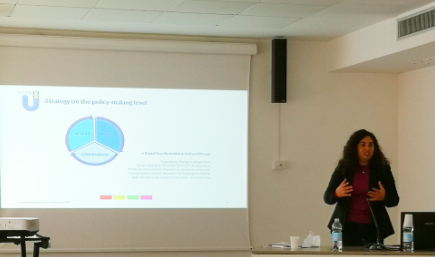
4th OpenU High-Level Authorities’ Meeting
Hosted by the Flemish Ministry of Education and Training, the OpenU project’s fourth High-level Authorities’ Meeting focused on the topic of “Micro-credentials”. The virtual meeting brought together Flemish policy makers and experts from Flemish Universities with their colleagues from France, Latvia, and Germany.
Starting with an overview of European and Flemish policy on micro-credentials, the meeting further provided participants with insights into the findings of the Microbol Project. The project supports ministries and stakeholders in exploring whether and how the existing Bologna tools can be used or need to be adapted to be applicable to microcredentials. The Microbol survey of the status of micro-credentials in the EHEA and its recent recommendations were presented, particularly focusing on Quality Assurance, Recognition and Qualifications Framework & ECTS.
Three universities shared their perspectives on challenges and future opportunities of microcredentials: KU Leuven as part of Una Europa Alliance, Artevelde University College, and Ghent University as part of the ENLIGHT Alliance discussed how to support the co-development of a clear and flexible European framework, how micro-credentials serve individual learning pathways and address labour-market needs, and how important digital credentials are to further establish micro-credentials. To create the link to the OpenU project, FU Berlin presented current plans for the further development of the BLOOM hub.
The speakers’ presentations will be made available on this website soon.
Recommendations gathered during the event will be shared within the project consortium and will be integrated into the public Policy Recommendations that are a final public deliverable of the project.
22 October2021
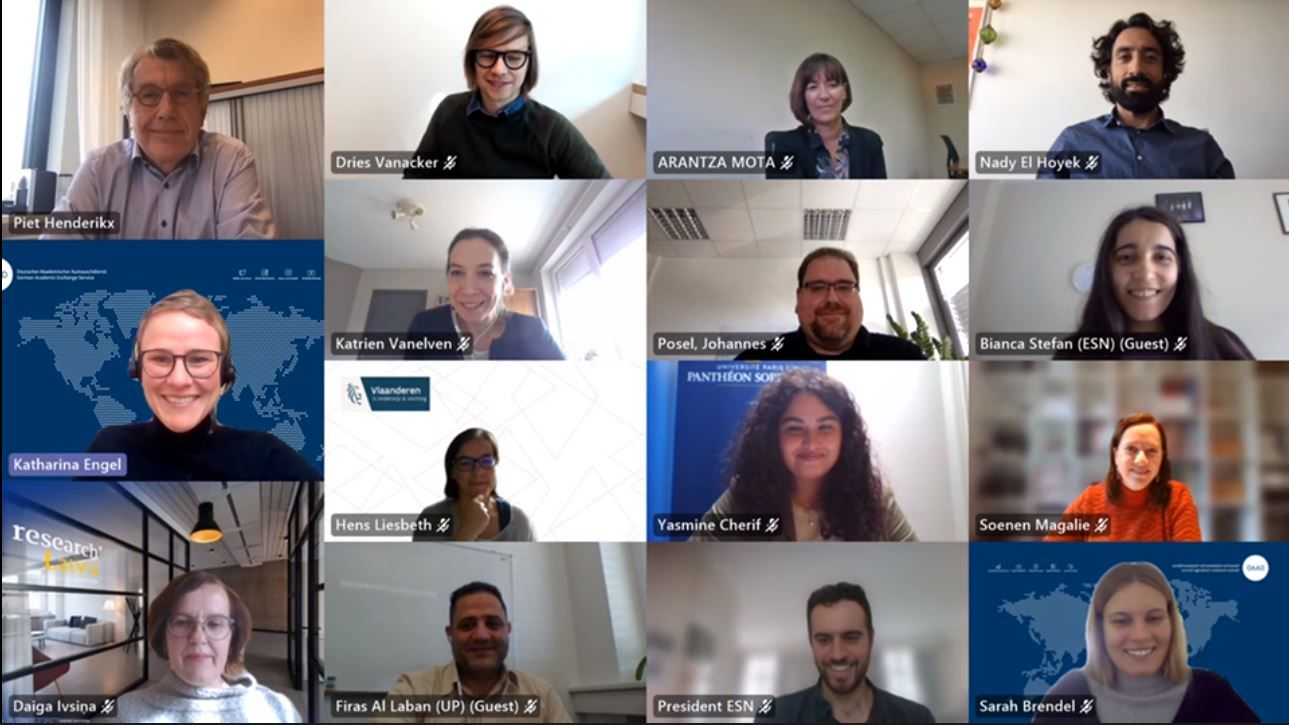
OpenU Steering Committee meeting in Paris
Paris 1 Panthéon Sorbonne hosted on Monday 13 September 2021 the Steering Committee meeting of the OpenU project to further the collaboration between its partners and put into effect its strategy for the implementation of the BLOOM hub.
After nearly two years of remotely-held meetings, the coordinating institution of the OpenU project hosted its Steering Committee in Paris. Representatives of four partner universities and associations attended this meeting, and were joined by two Steering Committee members who were able to contribute to the meeting through virtual means.
The one-day-long meeting brought together representatives of each of the work packages constituting the OpenU project. It served to reflect on the past year, plan the smooth implementation of the next months and kickstart the final 15 months of the project. During this event, the 12 contributors presented and discussed the latest developments and achievements of the OpenU project, which served to illustrate the deep and collaborative work that has been undertaken with all OpenU partners and the partners’ active involvement in the OpenU project activities.
Steering Committee meetings are regularly held between leaders of each Work Package. It acts as the decision-making body of the project and implements continuous improvement as part of its responsibility of overseeing OpenU tasks and activities.
20 September 2021
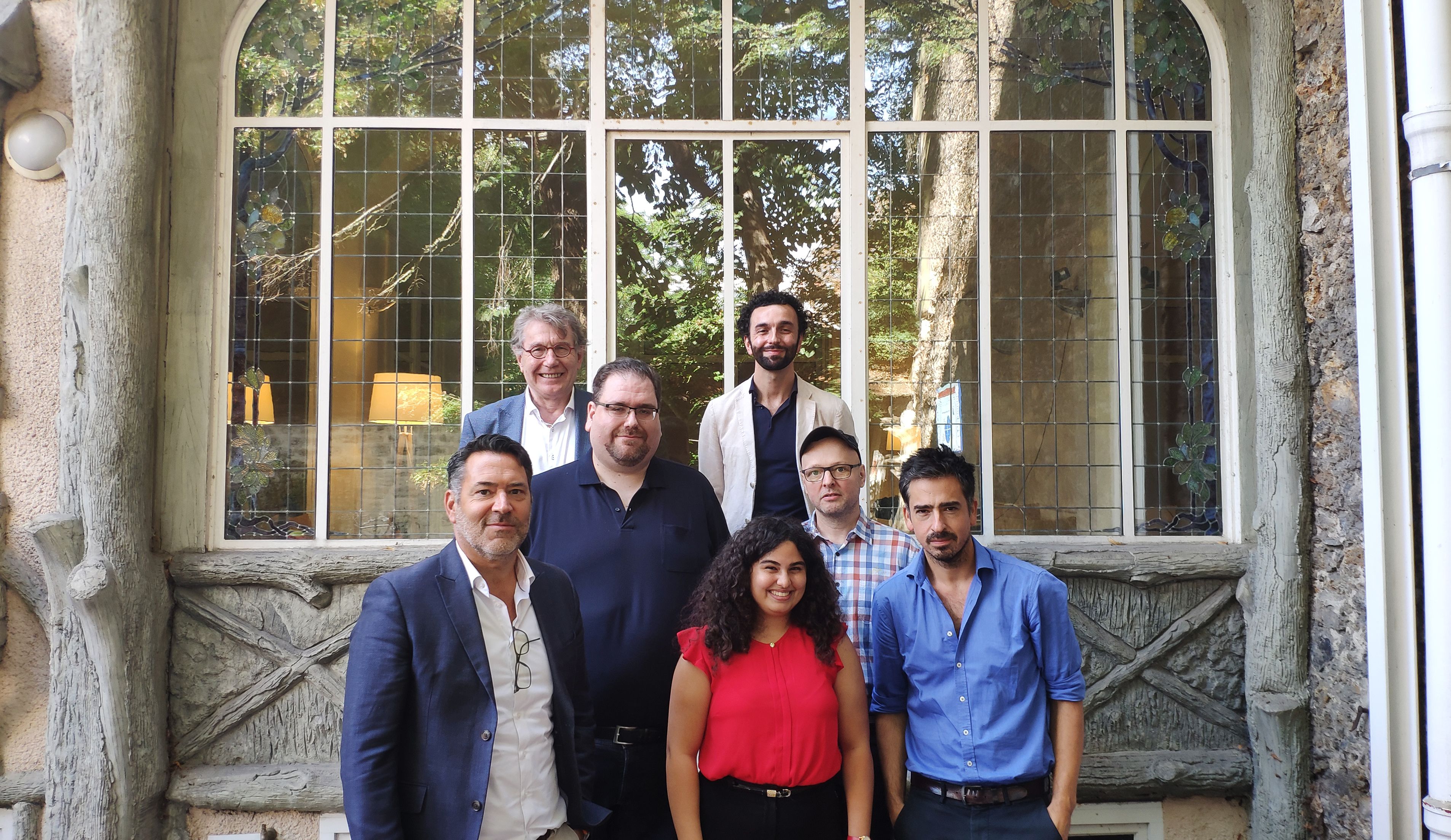
Third OpenU High-Level Authorities meeting (Portugal)
The OpenU project’s third High-Level Authorities Meeting focused on the topic of “Inclusive (digital) higher education”. Hosted by the Portuguese Ministry of Science, Technology and Higher Education’s (MCTES) Direção-Geral do Ensino Superior (DGES), the event took place in the context of the Portuguese Presidency of the Council of the EU.
Taking up the Presidency motto “Time to deliver: a fair, green and digital recovery”, experts from Portugal discussed with the OpenU Policy Cluster partners how the OpenU project can contribute to a fair and inclusive digital transition in the specific context of European higher education.
Presentations focused on Portuguese policies – on the national initiative INCoDe.2030 with a specific action on inclusion, and the Erasmus+ National Agency’s support of inclusive mobility – as well as on national perspectives from practice:
Participants gained insights into the inclusive approaches taken at the Universidade Aberta and the ECIU European University, learned more about the NAU platform’s strategies to target diverse learners with MOOCs, and were confronted with the important reflections on inclusion shared by the Portuguese umbrella organisation of local students’ unions (FAIRe).
The following thematic clustering gives an impression of the main topics of discussion:
- flexibilisation and personalisation of learning paths to cater to the needs of non-traditional students; aiming to embed universal design in higher education policy and practice,
- (online) lifelong learning, also as a means for upskilling and reskilling, to leave no one behind,
- the role of micro-credentials to contribute to a more inclusive (digital) higher education,
- virtual and blended mobility formats to facilitate access for all learners – without replacing physical mobility,
- fostering digital literacy of teachers and students’ digital readiness,
- blended formats and the social aspect of learning (and teaching) online: change in pedagogy, the spirit of the digital (international) campus,
- access and connectivity: being mindful of the digital gap and of issues with accessibility in digital education,
- language skills for open online education,
- flexible support services to students and teaching staff, promoting team culture, guarding mental health,
- taking a participatory approach to shaping the (digital and international) campus in an open, inclusive way.
The recommendations gathered during the event will be integrated into the Policy Recommendations that will be shared publicly as a final deliverable of the project.
The next HLAM, hosted by the Flemish Ministry of Education and Training, will take place in October 2021. This is followed by the HLAM hosted by the German Ministry of Education and Research in December 2021.
29 June 2021
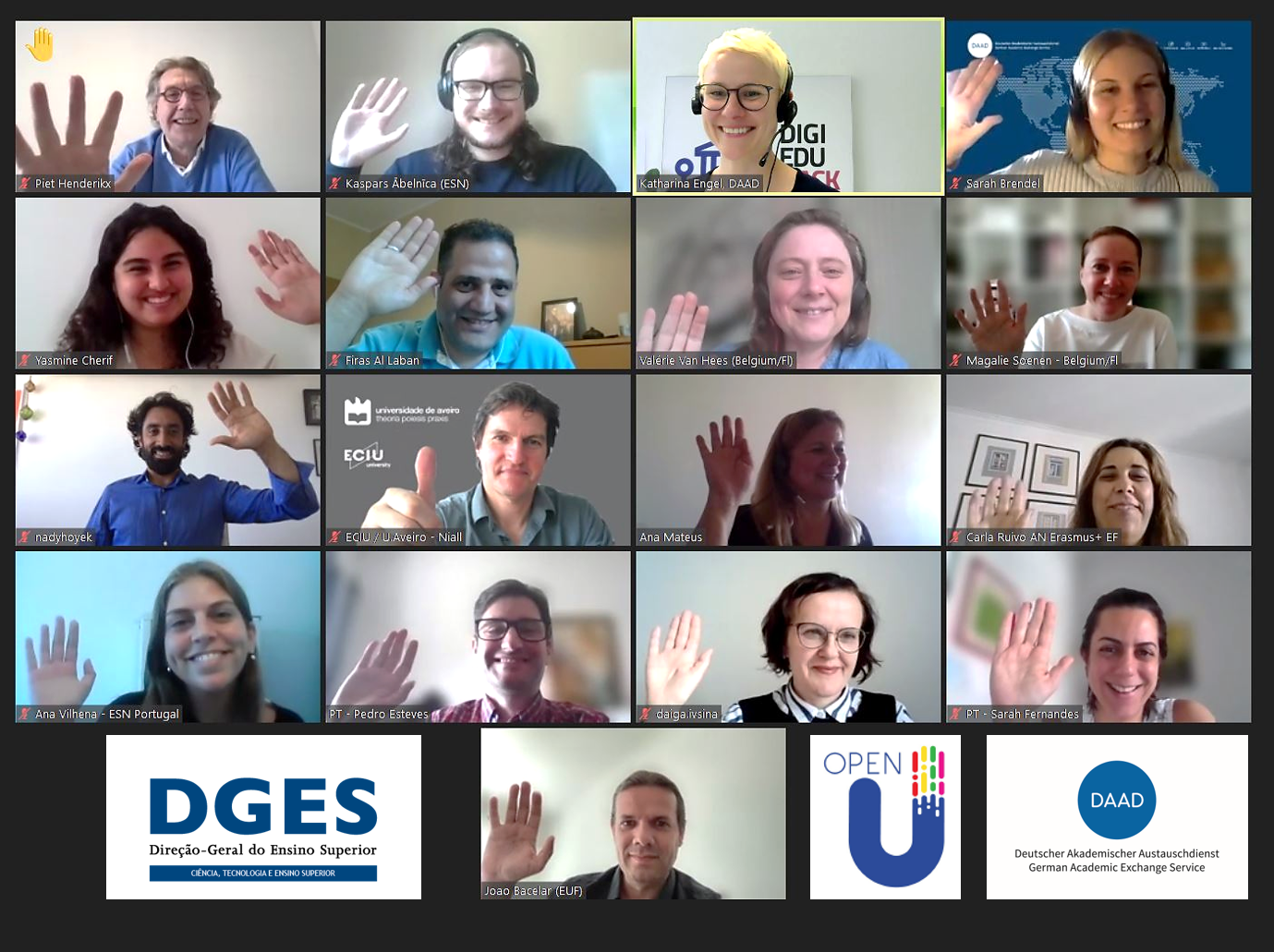
Web Seminar “Quality Assurance of European Universities”
The OpenU project’s second web seminar provided a space to discuss the complex issue of Quality Assurance of the European Universities.
Representatives of the two European University alliances that are involved in the OpenU project, EDUC and Una Europa, shone a light on their approaches to QA. These were complemented by a presentation on the EUniQ project which strives to develop a European framework for the comprehensive QA of university networks.
The inputs provided the basis for the panel discussion with student representatives from the Una Europa Student Board, the European Students Union (ESU), and the Erasmus Student Network (ESN). Moreover, national policy perspectives were shared by guests from the Spanish and the Flemish contexts, and a brief input on the most recent Council Conclusions on European Universities was provided by the Portuguese colleagues of the Ministry of Science, Technology and Higher Education (MCTES / DGES).
29 June 2021

© designed by Freepik / pch.vector
Assuring the quality of online education – a task made more challenging due to the pandemic
The first OpenU web seminar on Quality Assurance in Online Education took place on Friday 26 February. Over 200 people took part in the seminar which provided an excellent overview of the current status of quality assurance related to online education. Discussions and presentations highlighted a number of examples of good practices along with very relevant sources of further information. This seminar also served as a way to bring together the community of interest in this topic made up of experts and practitioners and provided a really useful opportunity to further discuss the implications for internal/external QA of online education in specific fields and areas of education.
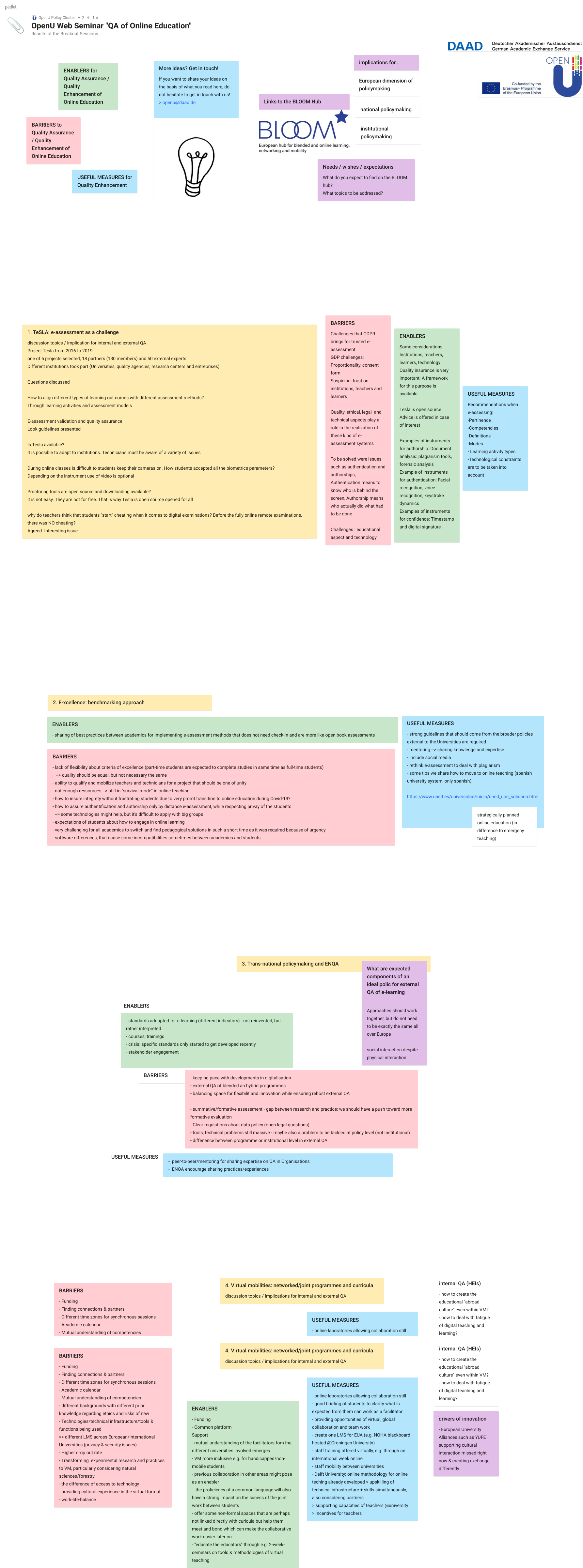
After a warm welcome and brief introduction from Alexander Knoth and Katharina Engel from DAAD in Germany, Esther Huertas from AQU Catalunya spoke in-depth about Quality Assurance and Quality Enhancement in Online Education. In her presentation, Esther talked about:
- Covid pandemic: exceptional strategies
- ENQA working group on Quality Assurance and E-learning
- The ESG: considerations for online education and the role of experts within HEI and QA agencies
- Platforms for stakeholder dialogue and exchange of good practice
After Esther’s presentation the audience was asked to take part in parallel breakout sessions on one of 4 topics:
- TeSLA: e-assessment as challenge led by Ana Elena Guerrero Roldán, PhD, Lecturer in Computer Science, Universitat Oberta de Catalunya, Spain, and coordinator of the TeSLA project
- E-xcellence: benchmarking approach and roadmaps for innovation-led by Jon Rosewell, PhD, Senior Lecturer in ICT, The Open University UK
- (Trans-) National policymaking and (EN)QA led by Anna Gover, Senior Project Manager at ENQA
- Networked and joint curricula in online education: virtual mobilities led by George Ubachs, Managing Director EADTU
Over 200 people took part in the seminar which provided an excellent overview of the current status of quality assurance related to online education. Discussions and presentations highlighted a number of examples of good practices along with very relevant sources of further information. This seminar also served as a way to bring together the community of interest in this topic made up of experts and practitioners and provided a really useful opportunity to further discuss the implications for internal/external QA of online education in specific fields and areas of education.
Please find here the agenda and the recording of the first webinar
This web seminar was organised with special support from EADTU. It is the first one in the web seminar series that DAAD is organising as coordinator of the OpenU project’s Policy Cluster
3 March 2021
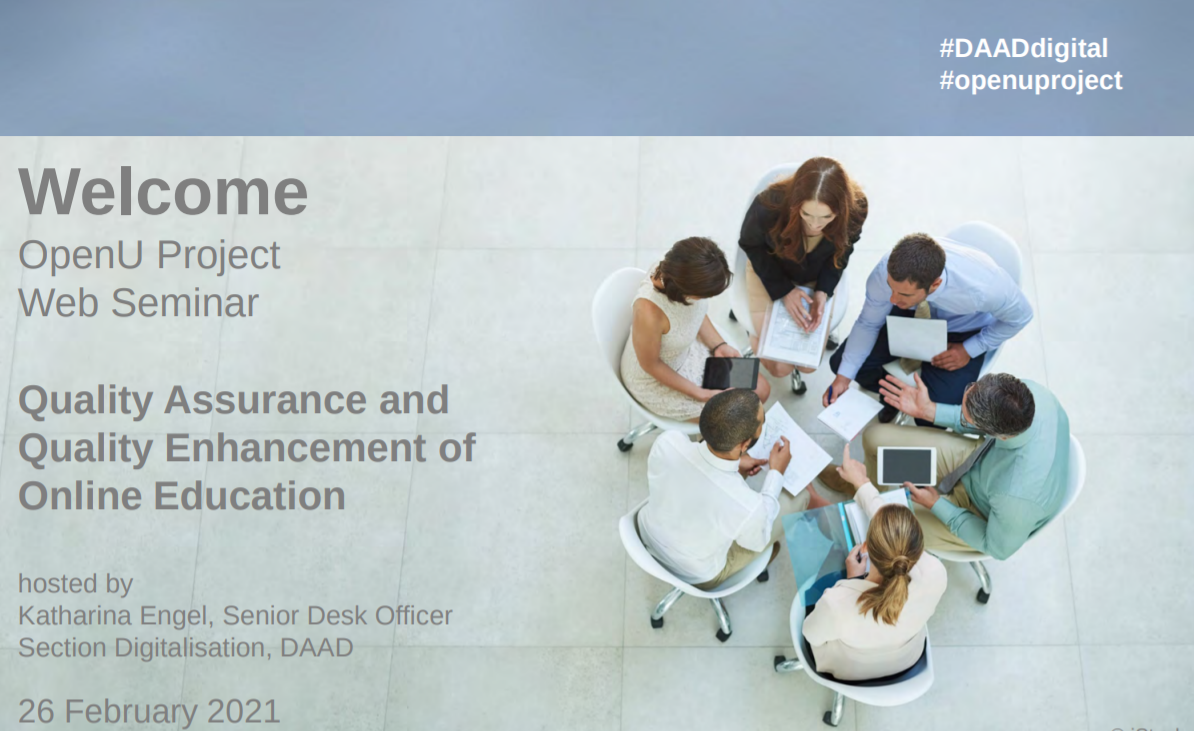
EUF Open Space
The Open Space is a 3-day project incubation event that gives participants the opportunity to find out more about EU funding opportunities, discuss their own project ideas with colleagues from across Europe, and plan the next steps for submitting and managing project applications.
The lively and creative environment also offers multiple networking and best-practice sharing opportunities among higher education staff working on EU projects.
1 March 2021
I·HE2021 conference in Bari
EADTU and The University of Foggia are organising this year’s onsite I·HE2021 conference in Bari (3-5 November 2021). Please check out the conference website, where they inform you about abstract submissions, conference registrations and all other details.
EADTU and The University of Foggia are looking forward to meeting you all in person again at this year’s event!
1 March 2021
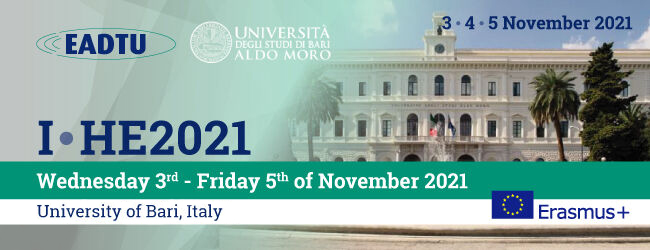
EADTU Message to the Ministerial EHEA Conference 2020
EADTU transferred a message to the Ministerial EHEA Conference 2020 in Rome. This message is the result of EADTU’s Innovation in Higher Education Conference (I·HE2020 online Bridging Event, 28-30 October 2020). EADTU’s Message refers to post COVID responses, the University of the Future, the role of micro-credentials and short learning programmes and the further support of European policies.
Please read the I·HE2020 – Message here.
18 December 2020
DigiEduHack 2020: redefining learning in a digital age
DigiEduHack brings together practitioners from around the world to discuss challenges for education and training in the digital age. It is an initiative of the European Institute of Innovation and Technology (EIT) under the European Commission's 2018 Digital Education Action Plan. DigiEduHack 2020 was hosted online on 12-13 November by the German Presidency of the Council of the European Union (EU). One of the three main organisers was OpenU partner, DAAD.
Check out the videos of the livestream and other resources here.
14 December 2020

The EADTU official Short Learning Programmes webinar week was a success (13-15 October 2020)
The Short Learning Programmes webinar week took place from 13-15 October 2020. It was a real success with insightful contributions from both presenters and audience. We opened the first day with the concept and characteristics of SLPs and the guidelines for designing SLPs. On the second day we looked at the implementation and recognition of SLPs. On the last day it was all about the lessons learned from designing and implementing collaborative SLPs. Overall, this was a very insightful webinar week.
11 December 2020

Third European Education Summit 10 December – recordings available
The third European Education Summit too place on 10 December. Entitled Digital Education Transformation, this event took place online and brought together a wide cross section of stakeholders including national education ministers, Members of the European Parliament (MEPs) and representatives of the education and training ecosystem. Recordings of all the streamed sessions are available online and you can check out the full programme here.
23 November 2020

41 European University Alliances representing 280 higher education institutions now active
Despite travel and other restrictions, the European Commission’s funded European University initiative is going from strength to strength. This programme is a flag ship initiative of the European Education Area and enables higher education institutions to collaborate in a variety of different ways, each distinct and matching members’ specific interests and contexts. OpenU and the Bloom hub will complement much of that is happening in these alliances in respect to digital collaboration.
You can find out more here
15 November 2020

Moving target digitalisation: re-thinking global exchange in higher education
On 5 - 6 October 2020, the German Academic Exchange Service invited the international and German higher education community to the virtual conference "Moving target digitalisation: re-thinking global exchange in higher education". The two-day event was an official conference in the context of the German Presidency of the EU Council.
The international conference focused on new aims and opportunities that arise from the digital transformation and its effects on internationalisation in higher education.
7 October 2020
Staff Support Webinar
EADTU organised a free Staff Support session online on 21 September 2020.
This webinar created a unique opportunity for staff support to meet, share expertise, and learn from their peers about different ways to organise support structures for online distance education during the coronacrisis.
Find more information here
22 September 2020

24 new European Universities reinforce the European Education Area
European Universities are transnational alliances of higher education institutions from across the EU that come together for the benefit of students, teachers and society. Today, the European Commission has unveiled the additional 24 European Universities that will join the first 17 alliances of higher education institutions selected already in 2019. With financial support from the Erasmus+ and Horizon 2020 programmes, they enhance the quality, inclusion, digitalisation and attractiveness of European higher education.
Under the next long-term EU budget for 2021-2027, the Commission proposed to roll out European Universities under the Erasmus programme, in synergy with Horizon Europe and other EU instruments.
25 July 2020
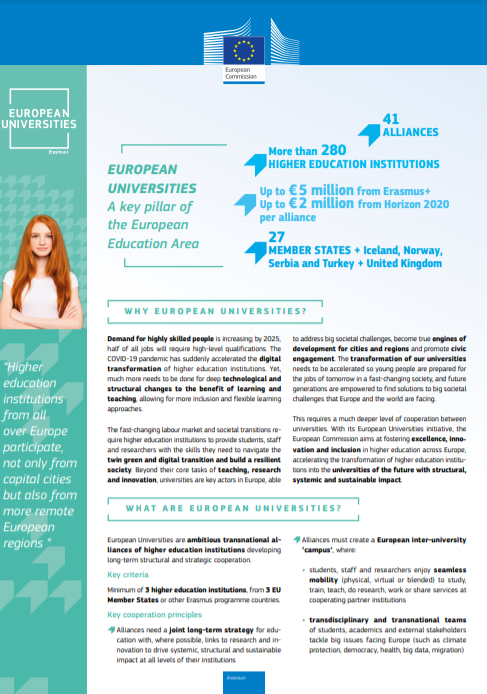
24 new European Universities reinforce the European Education Area
European Universities are transnational alliances of higher education institutions from across the EU that come together for the benefit of students, teachers and society. Today, the European Commission has unveiled the additional 24 European Universities that will join the first 17 alliances of higher education institutions selected already in 2019. With financial support from the Erasmus+ and Horizon 2020 programmes, they enhance the quality, inclusion, digitalisation and attractiveness of European higher education.
Find here more information about the University Alliance
10 July 2020

EUTOPIA takes next steps in making Bridges to European Economic Development through Universities, Partnership and Social Value.
The members of the EUTOPIA were invited by the University of Warwick to a high-level policy roundtable on Wednesday, 12 June 2019 at the Warwick Brussels Office for a policy event on Bridges to European Economic Development: Universities, Partnership and Social Value.
In the 21st Century, the task facing local, national and supra-national governments seeking to achieve socially acceptable economic development is becoming more complex. European universities thinking about their role in the 21st century can no longer merely be bastions of research and teaching excellence, existing in isolation. Rather, they must look beyond their walls to generate synergies with society, to foster both a spirit of international collaboration and to increase benefits to their local economies through ‘place-based’ collaboration. The European Union has recently launched the European Universities programme, which offers the opportunity for consortia of European universities to address these issues.
The EUTOPIA alliance explicitly aims to explore how institutions from across Europe can work together to promote inclusive growth and innovation in their regions and, in doing so, they seek to contribute to social welfare and to create value while promoting their commitment to culture as an instrument for deciphering the contemporary world, and while actively engaging with it. The EUTOPIA alliance will also seek to identify how its members can act as ‘bridges’ between their respective regions in order to maximise the collective impact of their work.
Click here for more information about the article
10 July 2020

Over 170 academics and researchers from Coimbra member universities took part in the pilot European university CHARM-EU’s first induction session for potential staff on 15 June 2020
The webinar introduced CHARM-EU’s innovative new approach to transdisciplinary alliances: Knowledge Creating Teams (KCTs). KCTs bring multiple disciplines together to face global challenges and are organised not by discipline, research or educational activity but by key themes that bridge all these activities. Three themes were chosen for CHARM-EU’s first pilot master’s programme: Life & Health, Water, and Food.
The response was positive and over 170 staff have now signed up to one or more of the KCTs in three areas: Food, Water and Life & Health. These KCTs are now participating in content creation workshops to create CHARM-EU’s pilot Masters in Global Challenges for Sustainability.
Through engagement with CHARM-EU, participants will be supported to build research networks with academic and extra-academic actors from across Europe and to focus their research efforts within thematic challenge areas. They will receive training in transdisciplinary approaches to teaching and research and novel pedagogies including challenge-based learning.
Find here more information
10 July 2020

Arqus Alliance holds the first meeting of the Arqus PhD Council
On June 30th, the first virtual meeting of the Arqus PhD Council took place, which was organized by the University of Graz as part of the Arqus Action Line 6 "Research Support and Early Stage Researcher Development".
The aim of the PhD Council was to enhance and intensify the collaboration in the field of doctoral training within the Alliance and to explore the possibility of the creation of an Arqus Graduate School.
At this first meeting, the PhD Council, consisting of scientists and experts in the field of doctoral education, discussed best practice examples in the training of doctoral students at the seven Arqus universities as well as institutional strategies for a successful doctoral training. In autumn, the PhD Council will meet again to discuss a first draft of recommendations for closer networking of the structures and content of doctoral training within the Alliance.
Click here for more information
10 July 2020

4EU+ Alliance: API project presented at the NAFSA 2020 virtual poster tour
On 4 June, the Academic Partnership for Innovation in Teaching and Learning (API) project was presented at the virtual poster tour organised as one of the online replacement events for the NAFSA 2020 Annual Conference, which was due to take place on 24-29 May 2020.
In light of the cancellation of the NAFSA 2020 Annual Conference & Expo due to the COVID-19 crisis, the organisers developed NAFSA eConnection, a five-day fully virtual programme that included guest speeches, concurrent sessions, chats with NAFSA exhibitors and a virtual poster fair.
The poster, entitled "How to support internationalization through innovative short module programmes", showcases the API project as an example of an initiative supporting strategic international cooperation in academic teaching.
API project brings together 4 member universities of the 4EU+ Alliance: Charles University, Heidelberg University, Sorbonne University and the University of Warsaw. It is funded by the Polish National Agency for Academic Exchange (NAWA).
Find more information here
9 July 2020

Mobility high on the list for policy-makers
OpenU partner DAAD conducted a stocktaking survey at the start of the project to collect information on expectations and thematic priorities from several key stakeholders. They included ministries of higher education in Portugal, Latvia, Germany, France, Belgium, Spain, as well as the Erasmus Student Network. The survey focused on cooperation, mobility and learning as well as the priority actions mentioned in the project proposal. The results show very clearly that mobility, blended mobility as well as the creation of mobility windows is of the highest priority for all partners involved. Other high priority areas highlighted in this survey included the inter-connection to existing initiatives as well as the cultural change necessary within Higher Education Institutions involving university leadership. For more information about OpenU.
Click here.
8 June 2020

OpenU contributes to Latvian National Skills Strategy during Riga meeting on 8 July 2019
The first OpenU Policy Dialogue took place on July 8, 2019 and was hosted by the Latvian Ministry of Education and Science in the Theatre Art Hall of the Latvian Academy of Culture in Riga. This meeting provided an opportunity to focus on the Latvian development of a National Skills Strategy as well as on current reforms in Higher Education which includes the preparation of a study on the digitalization level and digital practices in Latvian Higher Education Institutions.
Presentations from practitioners broadened the view on the national level while presenting the use and impact on digital teaching and learning within Latvian Higher Education Institutions.
For more information about OpenU click here.

First CIVIS HUb launched on Climate, Environment
Yet another of the eUniversity networks, CIVIS (a European civic university alliance) is moving ahead with ambitious plans for collaboration. CIVIS involving 8 universities is a transnational collaboration of civic universities. At the end of January, partners met to launch the first workshop on the development of the CIVIS hubs which are interdisciplinary thematic research and education areas which will be used to structure the CIVIS European University. Five hubs have been defined in the areas of Health, Cities, territories and mobilities, Digital and Technological transformation, Climate, environment and energy, and Society, culture, heritage. Each of these thematic hubs will offer joint study programmes at Bachelor’s and Master’s levels at the CIVIS member universities and will foster multidisciplinary research projects through innovative pedagogies. Climate, environment and energy will be the first CIVIS hub to be developed in 2020.
Read the full story here.
2 March 2020


Emily Palmer quotes Macron in her UNA Europa presentation at OOFHEC2019
What do eUniversities and President Macron in France have in common?
Quite a lot it seems from the presentation about the OpenU project given by Emily Palmer from KU Leuven at EADTU’s annual conference held in Madrid on 16-18 October. Back in 2017, President Macron called for “a network of universities across Europe with programmes that have all their studies study abroad and take classes in at least two languages. These European Universities will also be drivers of educational innovation and the quest for excellence.” That spirit of cooperation and exchange is clearly what underpins the UNA Europa project which Emily presented and which Emily presented and which is one of the partners in the new OpenU project.
2 March 2020

2020 European Universities Call open
The 2020 European Universities call for proposals was published on 7 November 2019 and will close on 26 February 2020. This action aims to encourage the emergence by 2024 of some twenty 'European Universities', consisting of bottom-up networks of universities across the EU which will enable students to obtain a degree by combining studies in several EU countries and contribute to the international competitiveness of European universities.‘European Universities’ have an ambitious mandate aimed to trigger unprecedented levels of institutionalised cooperation between higher education institutions, making it systemic, structural and sustainable. Check out this link for further information.
17 February 2020

UNA Europa officially kicks off 1Europe
The UNA Europa University Alliance Europe kicked off its flagship project 1EUROPE on 22nd and 23rd January 2020 (click here to read their full story).
1EUROPE aims to launch a living laboratory to develop future university models that are both replicable and scalable. 1Europe is funded by the European Commission under the Erasmus+ programme and sets out to lay the foundations of the university of the future, testing innovative teaching, joint learning and public engagement, promoting mobility among both students, and teaching and technical-administrative staff across the universities which are part of the UNA Europa network.
17 February 2020

This project has been funded with support from the European Commission. This website reflects the views only of the author, and the Commission cannot be held responsible for any use which may be made of the information contained therein.
This website is licensed under a Creative Commons Attribution 4.0 International License
Privacy policy EADTU
